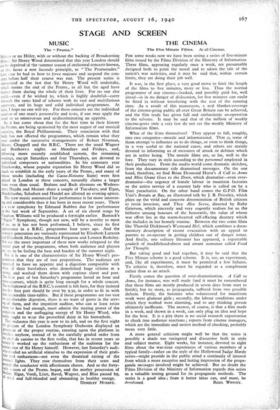THE CINEMA
The Five Minute Films. At all Cinemas.
FOR some weeks now we have been seeing a series of five-minute films issued by the Films Division of the Ministry of Information. These films, appearing regularly once a week, are presumably designed both to point the moral and to adorn the tale of the nation's war activities, and it may be said that, within certain limits, they are doing their job well.
It was, in the first place, a very good move to limit the length of the films to five minutes, more or less. Thus the normal programme of any cinema—booked, and possibly paid for, well ahead—is in no danger of dislocation, for five minutes can easily be fitted in without interfering with the rest of the running time. As a result of this manoeuvre, a real blanket-coverage of the cinema-going public all over Great Britain can be achieved, and the film trade has given full and enthusiastic co-operation to the scheme. It may be said that of the million of weekly cinema-goers only a very few do not see the weekly Ministry of Information films.
What of the films themselves? They appear to fall, roughly, into two categories—morale and informational. That as, some of them attempt 'o influence us to do things, or even to think things, in a way useful to the national cause, and others are mainly devoted to informing us of measures of attack or defence which are in active being. The morale films arc, so far, well to the fore. They vary in style according to the personnel employed in their production. From the studio world come dramatic sketches, from the documentary side dramatised messages. On the one hand, therefore, we find Brian Desmond Hurst's A Call to Arms and Miss Grant Goes to the Door, which dramatise—even over- dramatise—the urgency of female labour in munition factories or the active service of a country lady who is called on by a Nazi parachutist. On the other hand comes the G.P.O. Film Unit's Britain at Bay, an illustrated talk by J. B. Priestley, which plays up the vivid and concrete determination of British citizens to resist invasion; and They Also Serve, directed by Ruby Grierson, which sincerely and very cogently realises for us the hitherto unsung honours of the housewife, the value of whose war effort lies in the warm-hearted self-effacing decency which she includes in her homely routine. Between the two come films like Thorold Dickinson's Westward Ho!, which combines a docu- mentary description of recent evacuation with an appeal to parents to co-operate in getting children out of danger zones. And finally, one solitary bloomer has appeared, a regrettable goulash of muddleheadedness and arrant nonsense called Food for Thought.
But taking good and bad together, it may be said that the Five Minute scheme is a good scheme. It is, too, an experiment, and, like all experiments, it must be permitted a few failures. To criticise it, therefore, must be regarded as a compliment rather than as an attack.
Firstly comes the question of over-dramatisation. A Call to Arms, for instance, was well made (and it must be remembered that these EMS are mostly produced in seven days from start to finish); but its story, as propaganda, suffered from two possible defects. Firstly, the heroines who volunteered for munitions work were glamour girls ; secondly, the labour conditions under which they worked were alarming, and to any thinking person ultimately inefficient. The answer, of course, is that a film made in a week, and shown in a week, can only plug an idea and hope for the best. It is a pity there is no social research organisation to check true audience reactions ; reports from cinema managers, which are the immediate and easiest method of checking, probably mean very little.
A more general criticism might well be that the series is possibly a shade too variegated and discursive both in style and subject matter. Eight weeks, for instance, devoted to eight films about the war-time experiences of various members of a typical family—rather on the style of the Hollywood judge Hardy series—might provide in the public mind a continuity of interest from which a more receptive and lasting impression of the propa- ganda messages involved might be achieved. But no doubt the Films Division of the Ministry of Information regards this series as a valuable testing ground for its propaganda methods. The series is a good idea ; from it better ideas can, and must, be


























 Previous page
Previous page